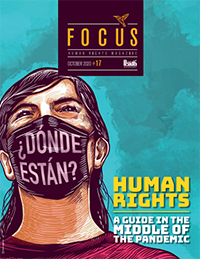In the face of the Covid-19 pandemic, governments, communities, and individuals are seeking guidance on the best ways to respond to this immense challenge. The human rights framework offers a relevant guide. The guidelines of various international bodies and the actions of civil society organizations attest to this.
Both the United Nations and the Inter-American Human Rights System have generated calls and guidelines for the emergency. Their statements share an extensive use of international human rights law to remind us that there are obligations and standards that cannot be ignored even during a crisis. They also clearly reflect the human rights approach, recognizing that these crises have a differentiated impact on the basis of gender, race, socio-economic status, age, nationality, etc.
In short, in the face of the pandemic, human rights are a useful tool. Beyond standards and treaties, it is the struggle for their implementation that can contribute to making the very essence of human rights a reality in the face of an immense challenge that generates profound fears and reminds us of our common fragility and that, while we all share equal dignity, we must take special care of those who are in the most disadvantaged sectors. In other words, it reminds us that we become more human when we care for those who still live in the most inhumane conditions.


